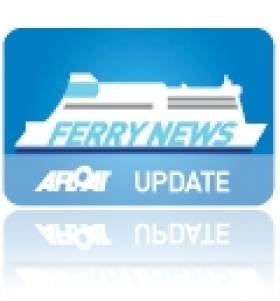Displaying items by tag: Grand National
Irish Sea 'Racehorse' Returns
Dawn Merchant and Brave Merchant represented the first pair of the 'Racehorse' class quartet of ro-pax sisters commissioned for the Cenargo Group. The quartet were built by Spainish shipbuilders Astilleros Espanoles SA in Seville, noting the first pair at 22,046grt where slightly smaller in tonnage terms compared to their 22,215grt counterparts Midnight Merchant and Northern Merchant. Upon delivery in 2000 the second pair were chartered to Norfolkline's Dover-Dunkerque route.
With a 130 truck capacity the Norman Trader can handle a marginally higher number of freight vehicles compared to the Norcape which handled 127 trucks. The Norcape, a 32-year-old freight-only vessel,was stood down in February and remains laid-up at Liverpool's Huskisson Dock. Incidentally, Norman Trader has joined one of her Racehorse class sisters, European Endeavour (formerly Midnight Merchant) which had directly replaced the Norcape on the central corridor route.
Likewise the European Endeavour is no stranger to the Irish route as for the last two years she has acted as winter relief vessel to cover the refits of the routes Dutch built ro-pax sisters Norbay and Norbank. The latter vessel is now undergoing a refit by Cammell Laird Shiprepairers in Birkenhead, now that the Norman Trader is in service to maintain the three-ship operated 8-hour route.
The Norman Trader had arrived into Dublin Bay last Friday from London's Tilbury Docks, on the next day she entered Dublin Port. In recent years she has operated on English Channel routes for the French shipping giant Louis-Dreyfus Armateurs through their ferry division LD Lines.
Norman Trader's (Dawn Merchant) sister Brave Merchant now renamed Norman Bridge also runs for LD Lines 'Motorways of the Seas' (MOS) route across the Bay of Biscay between Nantes /St. Nazaire to Gijón in northern Spain. The 14-hour route which started last year, which was run iniatially as a joint venture between Grimaldi Lines and Louis-Dreyfus and traded as GLD Atlantique.
- Dublin Port
- Bay of Biscay
- irish sea
- Ports and Shipping News
- Birkenhead
- Norcape
- RoPax
- DublinLiverpool
- Norfolkline
- FreightFerry
- Motorways of the Sea
- Norbank
- Norbay
- MOS
- European Endeavour
- Central Corridor
- P&O Irish Sea
- Norman Trader
- LD Lines
- Merchant Ferries
- Cenargo Group
- RaceHorse Class
- Tilbury Docks
- Cammell Laird
- Aintree
- Grand National
- Aintree Grand National





























































